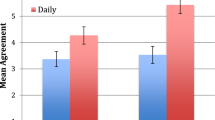Abstract
Cartesian dualism has been viewed by medical theorists to be oneof the chief causes of a reductionist/mechanistic treatment ofthe patient. Although I aver that Cartesian dualism is one culprit for the misapprehension of the genuine treatment of patients in termsof both mind and body, I argue that interactive dualism whichstresses the interaction of mind and body is essential to treatpatients with dignity and compassion. Thus, adequate medical carethat is humanistic in nature is difficult (if not impossible)to achieve without physicians adhering to a dualistic frameworkin which the body and person is treated during illness.
Similar content being viewed by others
REFERENCES
Cassell Eric J. The Nature of Suffering and the Goals of Medicine. New York: Oxford University Press, 1991.
Cassell Eric J. Recognizing suffering. Hastings Center Report. May-June 1991: 24-31.
Cassell Eric J. The Place of the Humanities in Medicine. New York: The Hastings Center, 1984.
Cassell Eric J. Clinical technique, Volume 2 of Talking with Patients. Cambridge, MA: The MIT Press, 1985.
Cassell Eric J. Changing Values in Medicine. New York: University Publications of America, 1979.
Cassell Eric J. Disease as an it: Concepts of disease revealed by patients presentation of symptoms. Social Science and Medicine 1976; 10: 143-146.
Cassell Eric, J. The Healer's Art: A New Approach to the Doctor-Patient Relationship. Philadelphia and New York: J.B. Lippincott Company, 1976.
Foucault, M. The Birth of Clinic: An Archaeology of Medical Perception. A.M. Sheridon Smith (trans.), Vintage Books, New York, 1975.
Haldane Elizabeth S, Ross GRT. The Philosophical Works of Descartes, Vol. I. Cambridge: Cambridge University Press, 1985.
Hastings, Arthur, Fademan, James, Gordon, James. Health For the Whole Person. Boulder, CO: Westview Press, 1980.
Nagel, Thomas. The View From Nowhere. Oxford: Oxford University Press, 1986.
Sullivan Mark. In what sense is contemporary medicine dualistic? Culture, Medicine, and Psychiatry 1986; 10: 331-350.
Switankowsky Irene. A New Paradigm for Informed Consent. Lanham, MD: University Press of America, 1998.
Toombs S. Kay. The Meaning of Illness: A Phenomenological Account of the Different Perspectives of Physician and Patient. Dordrecht: Kluwer Academic Publishers, 1991.
Toombs S. Kay. The temporality of illness: Four levels of experience. Theoretical Medicine 1990; 11: 227-241.
Toombs S. Kay. Illness and the paradigm of lived body. Theoretical Medicine 1988; 9: 201-226.
Toombs S. Kay. The meaning of illness: A phenomenological approach to the patientphysician relationship. Journal of Medicine and Philosophy 1987; 12: 219-240.
Zaner Richard M. Ethics and the Clinical Encounter. Englewood Cliffs, NJ: Prentice Hall, 1988.
Zaner Richard M. The Context of Self: A Phenomenological Inquiry Using Medicine As a Clue. Athens, OH: Ohio University Press, 1981.
Zaner Richard M. The Problem of Embodiment: Some Contributions to a Phenomenology of Body. The Hague: Martinus Nijhoff, 1964.
Author information
Authors and Affiliations
Rights and permissions
About this article
Cite this article
Switankowsky, I. Dualism and its Importance for Medicine. Theor Med Bioeth 21, 567–580 (2000). https://doi.org/10.1023/A:1026570907667
Issue Date:
DOI: https://doi.org/10.1023/A:1026570907667



